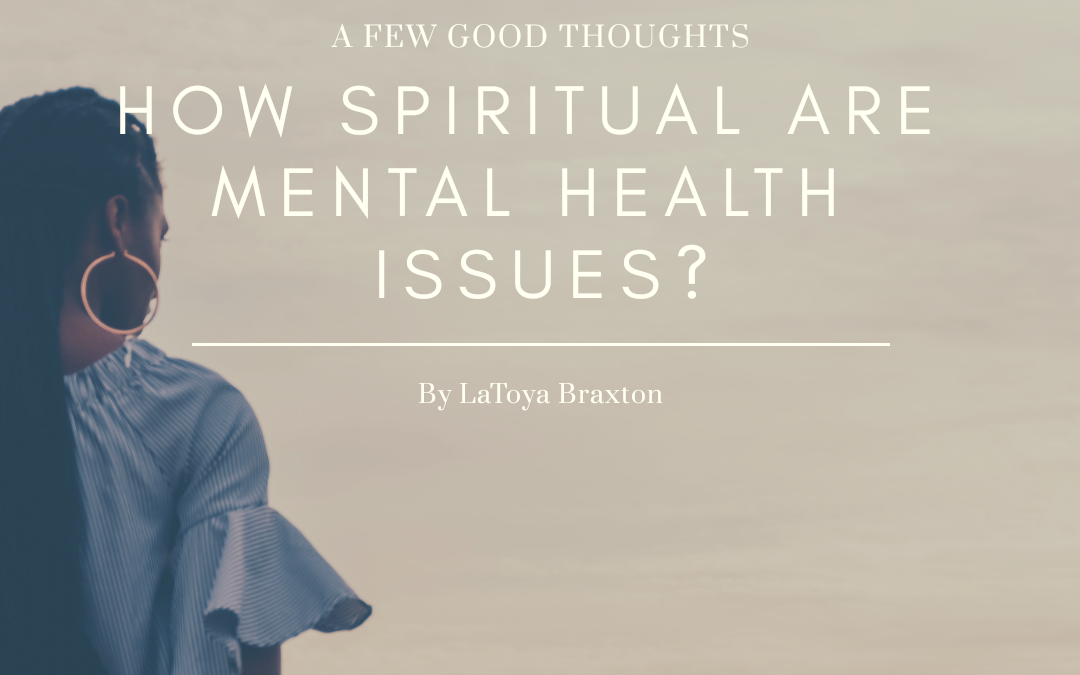Can God be getting my attention, about something I am doing wrong, if I am dealing with mental health issues? Can God be punishing me for something I’ve done if I have a mental health issue? Can a mental health issue be generational? Should I resist medication to address my mental health diagnosis if I am a Christian? Should I resist secular counseling if I practice a religion/ faith? Can’t my faith alone heal me? Aren’t mental health challenges, issues, and diagnoses demonic? Am I anxious because I don’t trust God enough? If I pray more will I be healed?
These are among the most common inquiries in the church body as Mental Health Awareness continues to integrate with spirituality. Before I even attempt to divulge into the loaded question: Are mental health issues spiritual, or in the alternative, how spiritual are mental health issues, I must make sure we are all, first, referencing the same definitions to the key words. Context is essential.
Mental Health Issue: Psychological impairment that affect one’s mood, thinking and behavior. Also referred in this article as: Mental Health Challenges/ Mental Illness
Spirituality: Relating to or affecting the human spirit or soul as opposed to material or physical things.
The scientific answer to our topic question is NO. While there may be spiritual associations to a mental health issue or illness, a mental health diagnosis is genetic, psychological, or emotional. By definition, it is important to know that a mental health illness does not [typically] equate to a spiritual struggle.
The mind (mental health), body (physical health), and soul (spiritual health) produce maximal results integrally, however, the three parts are capable to function [in most cases] independently. There are those who seek revelation and meaning in their experiences with mental health issues and those who are even graced with revelation and meaning. While mental health and spiritual health are not directly linked, because they are equal entities of a whole, one component is capable of impacting the other, significantly; If one’s mind is troubled by an occurrence, the impact can affect their spirit as well, and vice versa. Further, there are many individuals walking around, independent of an oxygen tank or wheel chair that are battling with mental health deficits, just as there are individuals with physical limitations who would not meet the criteria for a mental health diagnosis. In the same way, there are individuals with failing physical health who are at peace in their soul/inner spirit, just as there are individuals who may perform cognitively exceptional on an intelligence quotient (IQ) measurement, but lack a sense of identity and/or self-worth.
Spiritual interventions can often assist in positively coping with a mental health condition; however, this is typically not the most effective solution as it pertains to a clinical diagnosis and should be paired with a professional medical evaluation.
With permission, I will share a true story to assist you with understanding this perspective. Christina was born with traits of schizophrenia on both sides of her family. She lived a “normal” life in which she successfully made it to college, participated in honor societies, engaged in community advocacy, partied, gained competitive employment and lived life with no regrets…until life began to take over Christina as opposed to vice versa. Substance use, drinking, and promiscuity set precedence and became her new coping strategies as she witnessed her life consistently spiraling. Christina knew God through her parents and reverenced Him personally from a far; she even acknowledged indicators of some “greater power” from experiences along her own personal journey. Nonetheless, Christina continued living her life and one day began to encounter symptoms of schizophrenia in which she denied and attempted to drown out by self-medicating. She refused to accept the idea of medical intervention and began praying, fasting, reading her word, making promises to God, and involving herself back in the church…to no avail. It was not until Christina had to be admitted into a psychiatric facility, and for the first time, face others with the same symptoms, that she realized her need for medical evaluation. It took this occurrence, to assist Christina with realizing that God had not punished her with this chemical imbalance, and that while praying and reading the Word were vital, these interventions alone were not the cure to her psychological illness. Fast forwarding to today, as Christina is living in recovery of schizophrenia she tells anyone intrigued by her story that while her psychological diagnosis was not spiritual, she attributes her initial attempt to combat her psychological symptoms with faith practices, as the origin of her now committed lifestyle in her faith. She believes that while she did indeed need a lifelong medical prescription to subject her psychological challenges, it was also a spiritual awakening that God manifested to lead her away from the turn of doom she had taken and on to the road she is on today as a successful business owner, author, and mental health educator.
This story leads me to my next point. It is imperative to acknowledge the illness in mental health illness as an illness equivalent to a physical illness. For example, without doing the research, I dare say that a vast majority of a polled population of individuals who either broke a bone or consumed a virus, would instinctively seek medical assistance to assess their injury/illness. Would you agree? In this same way, we must accept that there are both spiritual truths AND medical truths. A part of the reason it’s difficult to acknowledge Mental Health Issues as real issues, especially in the church, is contributed to the false unwritten perception that Christians are not even supposed to have mental health issues. Common questions remain: If it’s not a punishment, why has He allowed it? If it’s not a curse, then why hasn’t He “fixed it”? (Boorstein, 2013). This mindset does not support the warned tribulations or the necessary perseverance that the Bible reveals but does not give specific criteria to in 2 Corinthians 4:8-9 and Romans 8:18.
While we can’t fall into the reductionism of believing all problems are chemically based and require medication, we also cannot fall into the reductionism of believing all problems are simply a matter of lacking spiritual disciplines. (Stetzer, 2013). Every case of Mental Health Illness is exclusive to the individual. I have no one hundred percent answer to give to every scenario in consideration to Isaiah 55:8 [ His ways are not our ways neither are His thoughts]. Although scientifically rare, there may be a mental health issue that an individual encounters, that is in fact derivative of a spiritual matter. My advice to this individual would be not to spend time attempting to decipher whether their condition is mental or spiritual on the onset of imbalance, irregularities, and unusual symptoms. Instead, identify your symptoms and seek holistic professional help immediately. In many cases, similar to physical ailments, the stage in which you seek help impacts the effectiveness of treatment.
In closing, as Mental Health Awareness continues to break ground in spiritual arenas, one thing we can all do collectively, is avoid making our own experiences the rule for others. Just because someone is struggling with a form of mental illness, does not mean it is a result of something they’ve done or have not done. Seek to assist. Cases are so different, and causes are so complex, that we need to spend less time attempting to discern the cause and rather challenge ourselves to exercise empathy, patience, and love in all of our dealings with one another (Stetzer, 2013).
Sisterly,
LaToya R. Braxton, M.Ed., Ed.S., AMFT, APCC
PS, here are my references, for those who would like to do additional study:
Boorstein, M. (2013). Suicide of star Pastor Rick Warren’s son sparks debate about mental illness. Washington Post.
Stetzer, E. (2013). Mental Illness & Medication vs. Spiritual Struggles & Biblical Counseling. The Exchange.

LaToya Braxton is a Pediatric Mental Health and Marriage and Family Therapist, currently practicing in her native state, California. In response to a deficit within her church and community, she launched a non-profit organization, with the objective to educate, confront, and channel the REAL essence of being a lady entitled, COVEREDGIRL. In addition to her advocacy for the holistic wellbeing of children, youth, and transitioning age adults, LaToya is a speaker, writer, entrepreneur, community advocate, and servant in her local church body. She is currently pursuing fluent proficiency in Spanish and American Sign Language. God’s will for her footsteps continues to require LaToya to travel the world, demonstrating His love through mental health and community organization. LaToya earned a Bachelor of Science Degree in Business Administration and Management from Stillman College, a Masters in Counselor Education from the University of Florida, and an Education Specialist Degree also from the University of Florida. Go Gators! For self-care, LaToya enjoys leisurely traveling, outdoor adventures, trying new cuisine, family time, and taking on DIYs.




Recent Comments